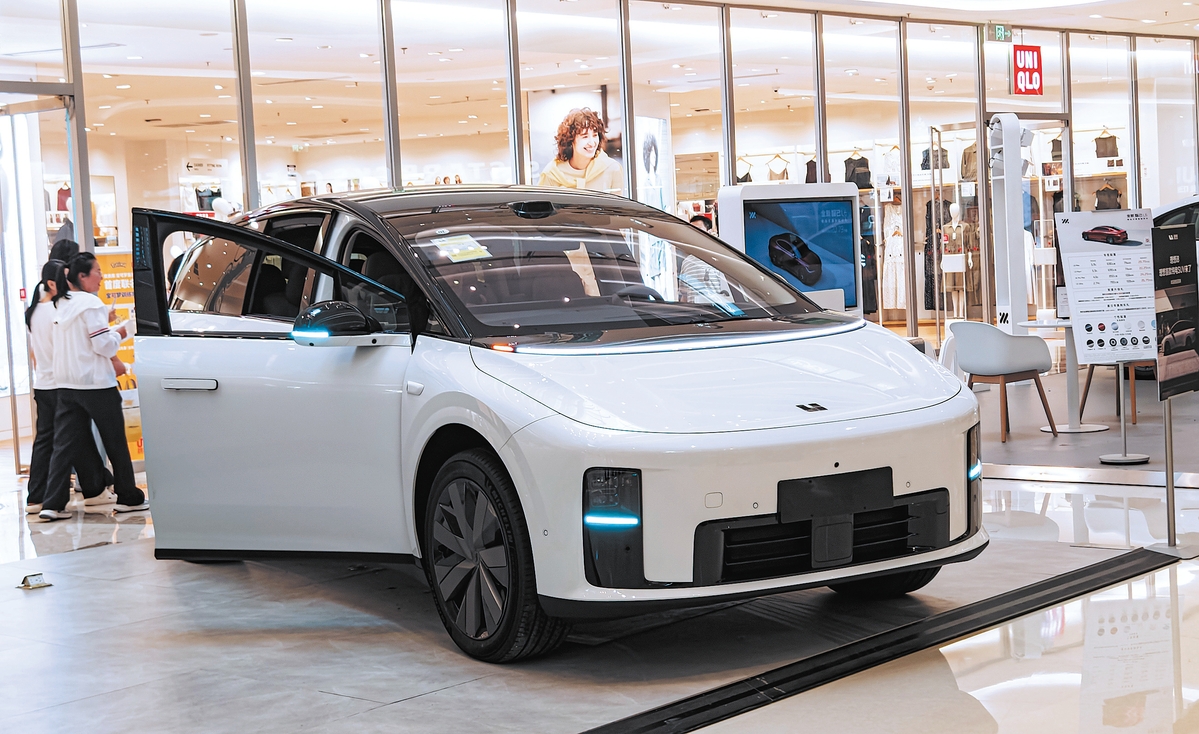
Li Auto had hoped to stage a comeback in China's crowded pure electric vehicle market with the launch of the i8 SUV in late July. This comes after the fiasco of its first electric car, the Mega MPV, launched in March 2024.
Now the company, known for extended-range plug-in hybrids, is mired in a backlash that highlights broader strategic and reputational challenges to the once high-flying automaker.
The controversy centers on a dramatic crash test video shown at the i8's unveiling. In the footage, the SUV collides head-on with an 8-ton truck, sending the larger vehicle airborne and almost separating its cab from the trailer, while the i8 appears intact, its airbags deployed, and battery system undamaged.
The clip quickly went viral — but not in the way Li Auto intended. Critics questioned the credibility of the test, noting that a light passenger vehicle causing such extensive damage to a fully loaded truck defies typical crash physics.
Many observers dismissed the stunt as "sensationalist", accusing Li Auto of relying on emotionally charged imagery to stand out in an increasingly competitive EV segment.
"This wasn't a safety demo — it was marketing theater," said a Shanghai-based automotive analyst who declined to be named.
The situation escalated when Dongfeng Liuzhou Motor, the manufacturer of the truck used in the test, issued a public statement condemning what it called a "scenario that misleads the public and damages the brand".
Usually, if a product of another company is used in such tests, its logo, name or any other information is concealed. This was not the case in the i8 crash test, for unknown reasons.
Some Li Auto executives initially adopted a combative tone, expressing willingness to repeat the test.
But the company and the China Automotive Engineering Research Institute, which conducted the test, later moved to ease tensions.
Both issued statements clarifying that the test was intended solely to demonstrate the i8's passive safety performance, with no intent to disparage the truck brand.
The i8 launch also became the subject of ridicule for another reason: a wooden table presented proudly onstage by CEO Li Xiang.
He touted it as a useful feature for passengers to dine on or children to do homework during road trips.
Social media users quickly drew mocking comparisons between Li's table and the more high-tech reveals by rivals Nio and XPeng, whose executives showcased in-house microchips at their product launches.
In the days that followed, short videos began circulating online showing Li Auto vehicles occupying multiple parking spots or blocking entrances, further souring public sentiment. Though unrelated to the product itself, the clips fueled a narrative of poor brand image and low-class customers.
The backlash has placed Li Auto in a precarious position. The company has been under pressure to regain momentum after the all-electric Mega MPV failed to resonate with buyers despite heavy promotion. The futuristic styling of the Mega proved divisive, with some praising its aerodynamic credentials but others claiming it resembled a hearse.
The i8 was intended to relaunch its pure EV ambitions. On paper, it offers solid credentials, including a high-voltage platform and family-focused features.
One week after launch, Li Auto abruptly consolidated the i8's three trims into a single "Max" variant saying that it was "surprised" that a big proportion of its users placed orders on the variant so it decided to "follow their advice".
While some users welcomed the move, which effectively offers a 20,000-yuan ($2,780) discount, analysts said it reflected hasty decision-making and unclear product positioning. They added that the so-called decision to follow users' advice was nothing but a price cut in disguise to boost sales.
"They're reacting to the market in real time, but it shows a lack of strategic foresight," said one auto consultant who wanted to remain anonymous.
Behind the theatrics lies a more sobering reality: China's new energy vehicle landscape is evolving rapidly.
The advantages that once fueled Li Auto's rise — its extended-range hybrids, family-centric branding, and early bet on the smart cockpit — are no longer enough to guarantee growth.
Statistics show that Li Auto sales stood at 30,700 units in July, down 39.7 percent year-on-year and down 15.3 percent from June.
Competitors such as Nio's sub-brand Onvo are quickly gaining ground with lower priced, better-integrated EV offerings.
There were posts on social media claiming that Li Auto sales representatives told prospective Onvo L90 buyers that the i8 is now cheaper than a week ago, encouraging them to return for a test drive and promising to offset the deposit they paid for the L90.
Investor sentiment has echoed that shift. Li Auto's shares tumbled more than 12 percent in Hong Kong the day after the i8 launch, though they recovered slightly following the price cut.
Some analysts remain optimistic about the company's strong brand recognition and loyal user base. Others view the i8 rollout as symptomatic of internal mismanagement; a lack of critical voices around the table that might have questioned the value of the crash video or the logic of the product trim strategy.
Still, the i8 is not without merit. It represents a technological step forward and Li Auto retains a sizable following among China's urban middle-class families.
If the company can avoid further setbacks and better align marketing with its engineering, Li Auto may yet secure a position in China's fast-changing EV hierarchy. But to do so, the company must recalibrate its marketing approach, and — above all — let its products speak louder than theatrics.
















